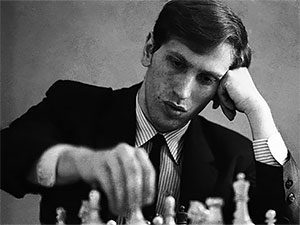Irwin Fisk: Had you met Fischer before you became the challenger?
Anatoly Karpov: Yes, I met Fischer when he became world champion, three months later.
IWF: Where was this?
AK: This was in San Antonio. There was this organizer, Mr. Church, who invited Fischer for the closing ceremony on the last day, so Fischer arrived. This was my first meeting with Fischer. He knew all the others [players]. He had played with them before, but we had never met. Fischer came five minutes before the round, so he shook hands with everybody, every participant. Then he disappeared and so he didn’t stay for the closing ceremony. I didn’t see him anymore, only this one minute.
IWF: What was your impression of him at that time?
AK: He looked very nice and friendly, so I had a good impression. I think it was nice to invite him as a special guest for the tournament, a great tournament.
IWF: To digress a moment, I understand Krogius was on Spassky’s team as a psychologist?
AK: He was a grandmaster and a psychologist. I don’t know in which role Spassky invited him. Spassky had had good relations with Krogius for many years since the beginning of the 1960s. I believe Spassky made a very big mistake before the match when he ended his relations with [Igor] Bondarevsky who had been his main coach or trainer for many years. He gave us lectures, and he understood chess very well and he understood Spassky much better than Krogius, psychologically.
IWF: Looking back on Fischer’s demands, do you feel any of them were valid?
AK: I think about the conditions of playing, some things he exaggerated, but not too much. He was fighting for the best conditions for the chess players. What he wanted was necessary. After Fischer stopped playing and I became world champion, I just followed the book of rules which we created for our match. Light is very important, because if you must concentrate for hours and sit in one chair for hours and days your chair should be comfortable and lights should be good, otherwise you become tired quickly. Fischer was correct, absolutely right.
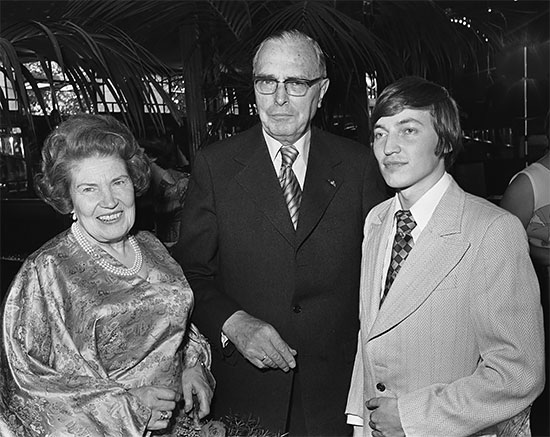
Anatoly Karpov with FIDE president Max Euwe and his wife in 1976
IWF: You eventually met Fischer again?
AK: I met him in 1976 in Tokyo, Japan. Fischer came especially to see me. At that time I had to obtain a Russian visa to leave the country. It was not free and I had to report why I wanted to go to one country or another. Fischer was free to travel, so the possibility was for Fischer to come to where I am. [Florencio] Campomanes had spread a lot of rumors that Fischer would come to the Philippines for an important tournament in Manila. But the last day came and Fischer hadn’t arrived and everybody thought this was just a rumor. Suddenly Campomanes told me that he had decided to visit Japan. At that time he was already FIDE vice-president of Asia. He said he hadn’t been to Japan for a long time and [Yasuji] Matsumoto, his friend, so he would come to Japan with me. Of course he knew the next day I would fly to Tokyo and that I would be there for two days.
IWF: So Fischer flew there just to meet you?
AK: Yes, Campomanes joined me for the flight to Tokyo, but of course he knew already that Fischer would be in Tokyo. When I arrived, Matsumoto was already in the airport, then we agreed to have dinner in the Hilton Hotel. I was in the hotel and then Campomanes stopped there in the Hilton. He asked me to come to his suite, so I came to his suite and he said I should expect a surprise. Suddenly, Campomanes went out and one minute later he came with Fischer, so this was a big surprise, of course. We greeted each other and shook hands, and then he started to talk. I think Matsumoto presided at this meeting and suggested we all have dinner together. It was unbelievable, because the Hilton is a big hotel, but as I remember we got to the restaurant at 7:00 o’clock in the evening and there were no other people in the restaurant. I was especially amazed that we had a table for four with no other people. We had a very quiet dinner; it was maybe like two hours. We discussed the possibility of playing a match, so of course we realized if we had been able to meet before, we would have played in 1975, a match. But, I think Fischer wasn’t ready to play, psychologically. He could not even tell himself he wasn’t ready. Yet, under pressure from Campomanes, he forced Fischer to come. When Fischer was with Campomanes, he said he was ready to play, but when he was alone and probably for himself he was saying, “No, no, I’m not going to play.” I think this was his problem.
IWF: When you were having the conversation with Fischer, what did he say about not playing you?
AK: No, we didn’t discuss this. I realized Fischer was a complicator and argumentative. I realized immediately he hated Jews and Communists.
IWF: So he was talking about that even at that time?
AK: Yes, he started talking and he would change topics talking about that. I said, “Bobby, let’s forget about this and talk about our match in chess, not about politics, not about these things.” So it was maybe his way to avoid the problem. Otherwise, he showed full respect. I know from other grandmasters that he respected chess players, especially very strong chess players. So we had a good talk, a good meeting.
IWF: Would the match be outside of normal channels or would it be for the world championship?
AK: He understood and realized and I understood that it would be the biggest match, so it didn’t matter, the cycle. For Fischer, this became important. Probably, I believe this was the final excuse for him not to play, because he insisted to have the title of Absolute World Championship of Chess Professionals.
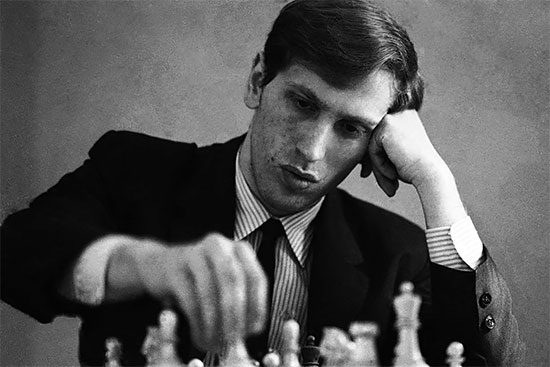
Bobby Fischer at his peak
IWF: It seems odd that he would come into this conversation ranting about Jews and Communists.
AK: This was not the first time.
IWF: Where were you when you heard that Fischer died?
AK: I was in Germany, in Hattenheim, a famous place of Formula One racing. I have a chess school there and we had a training session with the junior team of Germany. I think the director of the school came and said he had received news that Fischer had passed away. It was very sad.
IWF: What did you think at that time?
AK: Just as I said, it was shocking news, but I knew he had some health problems, maybe due to this prison in Japan. Also, he was captured in Pasadena. He wrote even a small book about his days in prison in Pasadena. He wrote that he was beaten. So, who knows. Maybe this was one of the reasons he started to have health problems. He was swimming, playing tennis and so he paid attention to his health, but suddenly he got these problems and as we know now he didn’t want to take his medicines, even medicine recommended by doctors. He didn’t believe them that he had these problems and so he died in the hospital. Of course the chess world lost a fantastic chess player and an extraordinary person. You may consider differently his declarations, but he was outstanding as a chess player. As I say, he probably was one of the most famous American citizens, even if he didn’t live all these years in the United States. He was one of the most famous, maybe Kennedy, Fischer, Elvis Presley. This is why. Marilyn Monroe. Even now, I know for sure in Russia if you asked people, they would say Fischer.
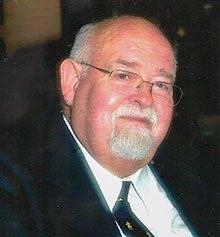 |
About the author
Irwin W. Fisk (www.fisk.us.com) is a freelance writer who has written numerous articles about chess. He is also currently on the board of directors for the Anatoly Karpov Chess School.
|
If you would like to see detailed grandmaster analysis of Bobby Fischer's openings, middlegame, and endgame:
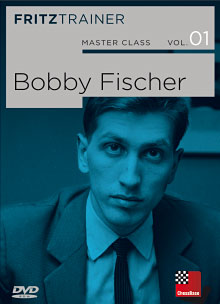 |
Master Class Vol. 1: Bobby Fischer
by Dorian Rogozenco, Dr. Karsten Müller, Mihail Marin, Oliver Reeh
€29.90
€25.13 without VAT (for Customers outside the EU)
$28.45 (without VAT)
This DVD can be purchased as a hard copy or it can be downloaded directly from the Internet, that way sparing you the few days needed for it to arrive by post.
Order this Fritztrainer in the ChessBase Shop
|
